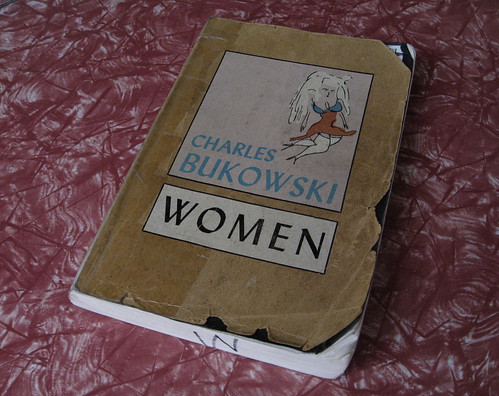Bukowski’s Women

This is a Black Sparrow Press edition of Women, by Charles Bukowski, published in 1996, two years after his death.
I reckon the library kept this copy fed and clothed for approximately ten years, where it sat on a shelf just long enough to recover from the hangover of the previous borrower before being dragged off again. The taped spine and brittle, battered cover age the book like baby oil and too many summer days spent at Revere Beach, so it looks as if it should be collecting a pension when, in actuality, this particular edition is still too young to drink, drive or vote.
The book’s condition challenges my belief that more people claim to have read Bukowski than actually have, though for all I know it circulated only once to a borrower who knew exactly how to enjoy Women.
At some point, as most things kept in public libraries must, it was withdrawn from the collection to make room for books that usher in a new wave of popularity, like novels about vampires, or, at the very least, can keep themselves together when upright, which is not at all in the spirit of Bukowski. The book inevitably had a “W” scrawled on its bottom and, I suspect, was placed in a recycle bin in the bowels of the library, where it was discovered by Ron, reference librarian and treasure hunter extraordinaire. As Fern did for Wilbur in Charlotte’s Web, he saved this copy of Women from an untimely death. Knowing what he had in his hand, which was an extra copy of something he probably has two or three more of at home, Ron did what all truly great librarians do: he passed it on.
The important things that shape my life enter uninvited, and I count this exact copy of Women as one of these important things. Would I have missed it completely if I hadn’t been standing behind the desk when Ron walked into the children’s room and had an opportunity to smack the book on the counter and say, “This is a great book?”
This book is the Pig-Pen of paperbacks and should have fleas buzzing around it. The only thing that hints at vitality is the voluptuous doodle of a woman, all hips, chest and blond hair. As I picked it up, page 7 floated to the counter and that was the moment it became mine. The story of Henry Chinaski spilled out with tales of loneliness kept at bay, or not, with sex, small talk, no talk, gambling, drinking, classical music and a typewriter. For the first time in my life tidy dwellings, toned arms, and thank you notes represented the toil of avoiding the honesty in the grime and imperfection that Bukowski embraced.
Not only should you read this book, but you owe it to yourself to find the most ratty, exhausted copy you can get your hands on. If you’re lucky, there’s a library out there that still has one like this. If you’re really lucky, you’ll know someone who can put it in your hands and share it like a best kept secret.—Cathy